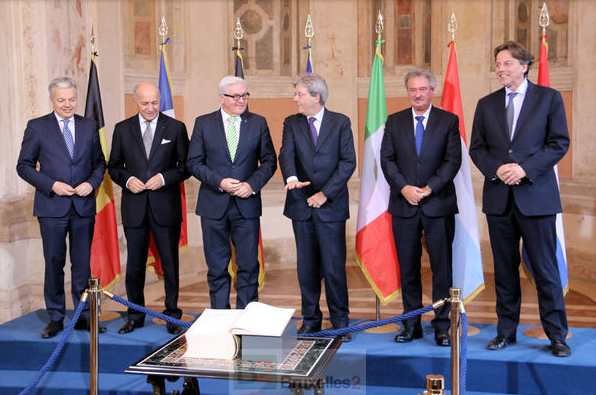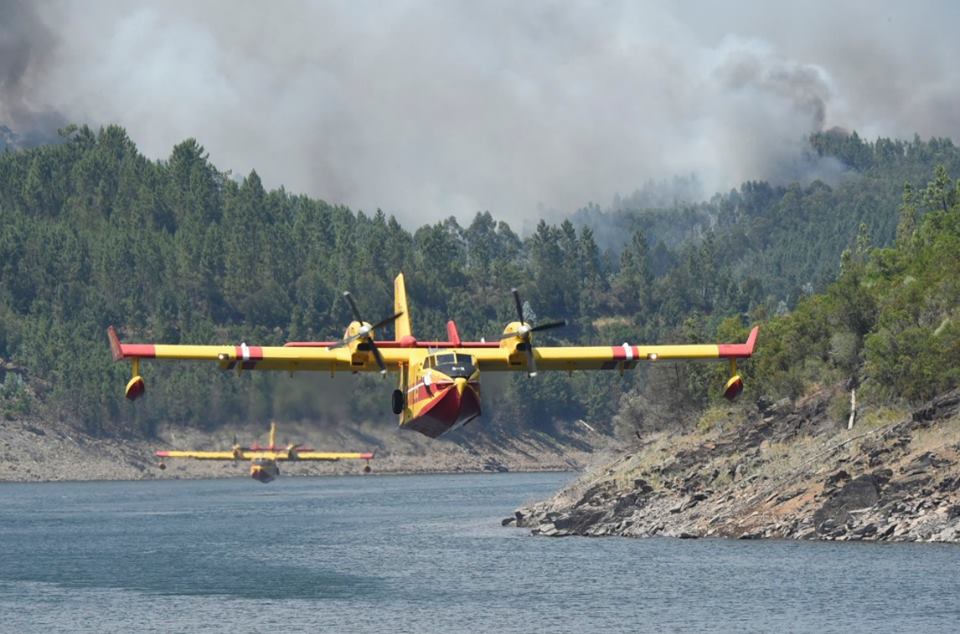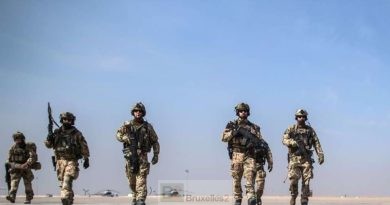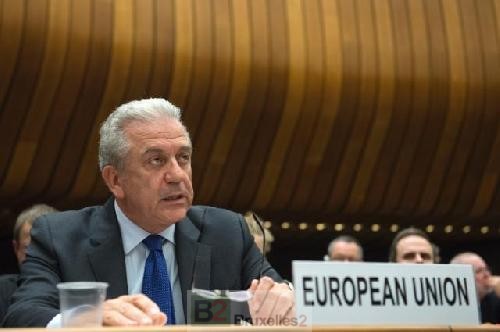The Six are fighting back! (caps2)

(B2) The six Foreign Ministers of the founding countries of the European Union (1) have just approved this Tuesday (February 9) in Rome a declaration entitled " Charting the way forward” in order to “ strengthen thecohesion in the European Union”. Sixes claim to be very concerned about the state of the European project ". But they affirm their desire to fight for European solutions and in particular wanting to continue the European work of a " ever closer union ". A sort of response to those who advocate a looser union.
The start of other commitments?
For once, B2 fully transcribed this declaration (2) which is, in itself, a final reminder of certain known principles but could initiate other commitments in the future. While the statement contains no mention of a new Treaty, it is in everyone's mind that European integration is not dead as the UK would like. Didier Reynders recalls this in an interview published by our colleague from Le Soir, Jurek Kuczkiewicz (Wednesday): “There is a desire to go further. (...) There will be two phases: first (see) how to move forward within the framework of the existing treaties. Then (see) how to move forward in the longer term. If this requires treaty changes, we know that it will be much heavier ».
A next meeting in Brussels
For the Belgian Minister for Foreign Affairs, the Six intend to react to a possible obstacle to European integration " Some may not want to go any further, this is the case of Great Britain and others. But on a number of important issues, the six of us believe we should provide stronger European solutions. This is not an abstract discussion to say that we want more Europe. We want a stronger Europe in certain areas. The next meeting of the Six will be held in Val Duchesse, on the very spot where the Treaty of Rome was prepared.
A France in tow
We can notice the very low enthusiasm of France on this subject. Quite noticeably, the French, usually so quick to communicate as soon as there is Franco-German or major declarations, have remained very discreet on the subject. " Maybe it's not really the right format says a French diplomat with enthusiasm as strong as the condemned man who climbs on the guillotine... The text was not even written in French. And the French version was, still on Wednesday... non-existent!
The worrying European project
As Europe approaches the 60th anniversary of the Treaty establishing the European Economic Community on March 25, 2017, we are concerned about the state of the European project. Indeed, he seems to be facing a very difficult time. In these critical moments, we, as founding members, feel particularly called.
An ever closer union
We must not forget that Europe had to go through violent conflicts and a painful history before continuing on the path of integration. For many generations, Europe was simply a dream of peace and understanding, accompanied by the hope of human dignity, freedom, democracy, the rule of law and solidarity on the continent. The European project has enabled us to make these very principles the foundation of our coexistence in Europe. They have been the basis of our security, stability and prosperity. They are also our capital for our common future. We firmly believe that the European Union remains the best answer we have for today's challenges and allows different paths of integration. We remain determined to continue the process of creating an ever closer union between the peoples of Europe.
The refugee crisis: fighting for European solutions
Europe is successful when we overcome (our) own narrow interests in the spirit of solidarity. We must be ready to fight for European solutions. The EU is much more than the sum of its 28 Member States. This also applies to the refugee crisis, one of the greatest challenges currently facing the European Union. The priority is to fully implement our joint decisions with efficiency and humanity. Better management of the Union's external borders is essential to make them more secure without hampering the fluidity of movement and the Schengen acquis. Europe needs a balanced and geographically global approach, based on solidarity and responsibility. It is crucial to strengthen comprehensive cooperation with countries of origin and transit, with a view to stemming the flow of irregular migrants and tackling the root causes of migration.
The fight against terrorism: fundamental
The recent terrorist attacks have targeted the fundamental values and human rights which are at the heart of the European Union - solidarity, freedom, including freedom of expression, pluralism, democracy, tolerance and human dignity. All citizens have the right to live free from fear. Our common values must be protected and violence and racism must be fought. More needs to be done to prevent radicalization and develop a counter-narrative. It also means fighting against the enemies of our core values. We confirmed the need to further strengthen the fight against terrorist threats, in full compliance with human rights and the rule of law.
The Union a global player
We discussed the role that the Union is called upon to function as a global player. The EU's new global strategy on foreign and security policy will provide the Union with an updated vision and effective tools to stimulate its action. It will emphasize the importance of the European security and defense policy at the heart of European commitments for peace and stability in the world. A democratic, stable and prosperous neighborhood is a strategic priority and in the fundamental interest of the EU.
We declare and confirm our strong commitment to Europe and the European project and invite all other Member States to join.
In summary in the language of Shakespeare, this gives: We are concerned about the State of the European project (...) We remain resolved to continue the process of creating an ever closer union among the people of Europe. (...) Europe is successful when we overcome narrow self-interest in the spirit of solidarity. We have to be ready to strive for European solutions. (...) We declare and reconfirm our strong commitment to Europe and the European project and invite all other Member States to join. »
(1) Belgium, Germany, France, Italy, Luxembourg and the Netherlands
(2) Download the declaration in English here. This text has been translated by us. It therefore does not represent an official version.
Read our analysis: God save the Queen! Europe on the eve of a political revolution?
(Maj) 10.2 morning with the elements of Didier Reynders in Le Soir
Translation done by B2, the intertitles are from the editorial staff



